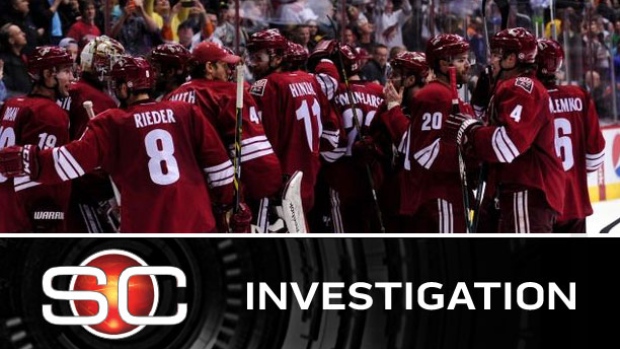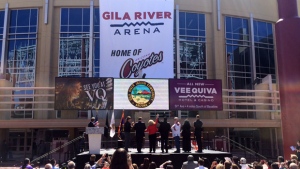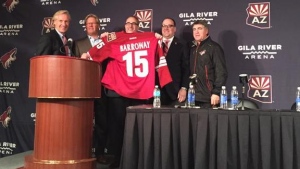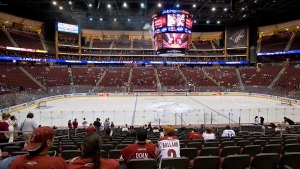May 15, 2015
Coyotes' survival hinges on arena deal battle
As TSN Senior Correspondent Rick Westhead reports, senior elected city officials in Glendale, Arizona say they are exploring whether legal grounds exist for them to void an arena management contract with the Arizona Coyotes, an agreement that calls for taxpayers to contribute $15 million per year over 15 years to the flagging NHL club.

Senior elected city officials in Glendale, Arizona, say they are exploring whether legal grounds exist for them to void an arena management contract with the Arizona Coyotes, an agreement that calls for taxpayers to contribute $15 million per year over 15 years to the flagging NHL club.
When the city council in Glendale voted to give the owners of the Coyotes $225 million (all U.S. dollars) over 15 years, the money was supposed to be used by the team to manage the 12-year-old Gila River Arena, where the Coyotes play their home games.
The deal helped narrow the losses of a club that sports investment bankers say is a perpetual money loser, bleeding some $50 million or more per year.
But nearly two years after council approved the controversial pact, city officials claim the money that cash-strapped Glendale is paying to the team's owner IceArizona is instead going directly to Fortress Investment Group, the New York-based asset manager which financed holding company IceArizona's purchase of the Coyotes.

Glendale Vice Mayor Ian Hugh says using taxpayer dollars to pay down the team's debt rather than for direct arena management expenses amounts to a breach of contract. Hugh says he hopes in coming weeks to rally support on Glendale's seven-member city council to direct the city's attorney to explore whether the Phoenix suburb can get out of its contract with the Coyotes, a potential legal battle that could finally herald the Coyotes' exodus from the desert.
"The taxpayer got the short end of the stick," Hugh said in an interview. "If they call this an investment, you'd think there would be a possible return. I'm hard pressed to see the benefits to the city of Glendale."
The Difference In Numbers
The city does receive a portion of revenue sharing from the arena's operations. Last year, the city received about $6.5 million from IceArizona, which means the deal cost the city about $8.5 million.
"I asked our finance director...if the hockey team packed up and left the next day, what would be the impact, and the answer was an $8.5 million windfall profit for us," Hughes said. "We increased sales tax to the citizens to cover this (arena management deal). We have needs in law enforcement and our fire department that we can't fund. We had to put off purchasing of new pumpers for the fire department. We have three libraries in Glendale and all of their hours have been cut way back."
Hughes also said three new city councillors were voted in in December and views on council about the Coyotes deal may have changed.
When Glendale's city council approved the arena management deal on July 3, 2013, the vote was 4-3. But since then, two councillors who voted in favour of the contract have left council, while Hughes and Glendale Mayor Jerry Weiers, two of the three who voted against the contract, remain.
Hugh wants to find a way to narrow the city's hockey losses, noting Glendale also pays $8 million a year to service the debt on the Gila River Arena.
That's because consultant Tony Tavares, the onetime president of both the Dallas Stars and Mighty Ducks of Anaheim, has delivered to Glendale city auditors a report that alleges IceArizona under-reported its losses last season during the first year of the 15-year arena management contract, sources tell TSN.
While IceArizona said it lost $34.8 million during the 2013-14 NHL season, Tavares's confidential report claims the holding company lost far more than that. TSN couldn't confirm the exact amount Tavares claims IceArizona lost. The report suggests tactics the city might take to challenge the Coyotes in their bookkeeping.
TSN spoke to a source with first-hand knowledge of Tavares' report who said any such misreporting could arguably be used by lawyers to claim that the team has breached the terms of its arena management contract.
The Tavares report isn't expected to be disclosed to taxpayers because of a confidentiality agreement between the city and team. It also notes that there are so-called "cure periods" where the team can, within a limited period of time, correct any financial misreporting, the source told TSN.
Tavares declined to comment, citing a non-disclosure agreement with Glendale.
When contacted by TSN, Coyotes part owner Anthony Leblanc wrote in an emailed statement, "The Arizona Coyotes are in full compliance in regards to our agreements with the city of Glendale, and if there are any issues or questions that the city or its officials may have, they certainly should raise them directly with the team as opposed to doing so through the media."
The Coyotes' Saga Continues
The Coyotes have routinely been a hair's breadth from leaving the Arizona desert.
In 2011, after then-Coyotes' owner Jerry Moyes put the NHL club into bankruptcy protection and tried to sell it to Research in Motion co-founder Jim Balsillie, who planned to move the team to Hamilton, the NHL seized control of the Coyotes and threatened to move the team unless taxpayers agreed to give the NHL $50 million to cover the team's losses.
Two years later, after Glendale council approved the $15 million-per-year arena management contract, Canadians Anthony LeBlanc and George Gosbee bought the Coyotes from the NHL. Then last December, in a move that allowed the Coyotes to take advantage of the NHL's low-cost line of credit, LeBlanc and Gosbee announced American hedge fund manager Andrew Barroway had obtained majority interest in the Coyotes.
Yet ever since, Glendale Mayor Weiers and Vice Mayor Hugh tell TSN that neither have been able to meet with Barroway in person in Arizona.
Both Weiers and Hugh want to review the naming-rights contract the Coyotes have signed for the Gila River Arena because, they say, 20 per cent of the revenue from that contract is supposed to go to the city.
In 2006, the team signed a 10-year, $30 million naming rights deal for the arena with Jobing.com, a local employment website.
But last August, the Coyotes canceled that agreement and signed a nine-year deal for naming rights with Gila River Casinos. Financial terms have not been released, Glendale officials say, even though Hughes and others says taxpayers have a direct financial interest.
"We're giving them $15 million a year, you'd think they'd be a better partner," said Gary Sherwood, a Glendale city councillor who voted for the arena management deal. "You'd think I should get a meeting out of (Barroway) and I can't...haven't been able to since at least the (Christmas) holidays."
Hide And Seek?
Weiers and Hughes also say they want Barroway to prove that he's actually the majority owner of the Coyotes. But there's been a snag, as Weiers said Barroway refuses to come to Glendale for a meeting.

"All Barroway says he'll give us is 90 minutes, and he says it has to be in New York," Weiers said in an interview. "I'm not going to New York for 90 minutes. I mean, the team is here in Glendale. What's the problem?"
Both LeBlanc and NHL deputy commissioner Bill Daly confirmed Barroway is the team's majority owner. "Andy owns 51 per cent of the Coyotes currently," Daly wrote in an email. "He has not missed or failed to make a single payment. He hasn't threatened not to make a payment."
But Leblanc denies that Barroway has refused to meet with city officials. "Mr. Barroway in fact had a meeting set up with the mayor and council and they cancelled due to going into an emergency executive session to fire their city manager," Leblanc wrote. "He has since had a call with the mayor and invited him to come to New York City. Lastly, he has met two council members at Coyotes games in Glendale."
Moving Up vs. Moving Out
Councilor Jamie Aldama said he wants to see the Coyotes stay in Glendale, and said they've had a positive economic impact on the city's Westgate Entertainment district. "It's at what cost do we want to keep them?" Aldama said. "We're paying for them to manage an event building. That's all we're worried about. We don't tell them where to put their money or what to do with it. But if there's reason to believe there's a breach in contract, well, I represent the taxpayers and if they're not doing what they're supposed to be doing, then we need to act on that."
Aldama said he, like many locals, worry that the Coyotes may well move within three years.
That's because under the terms of the 15-year agreement, the team can opt out after five years if its collective losses eclipse $50 million. That threshold will easily be reached in this, the second year of the agreement, a source familiar with the team's finances told TSN. The source said the Coyotes might have underreported losses because they don't want the team's customer base to assume that the team triggering the out clause is a foregone conclusion.
Nevertheless, sports investment bankers and four senior NHL sources, including one NHL team owner, told TSN that there's a widespread belief among NHL executives that the Coyotes are doomed in Glendale.
At one time, former Coyotes owner Steve Elman pursued the construction of a new arena in Scottsdale, a suburb west of the greater metropolitan area, and that arena might have been a difference maker since Scottsdale has the fourth highest per capita income in the state ($49,158). Glendale, which has per capita income of $19,124 (60th in the state), is on the east side of Phoenix, at least an hour's drive away during rush hour from Scottsdale, Sherwood said.
To be sure, the Coyotes have a vocal and loyal, if small, fan base which points to participation in amateur hockey in Arizona climbing, and that some local rep hockey teams have won elite-level tournaments, beating Canadian competition. Prospect Auston Mathews, who is expected to be the No. 1 overall pick in the 2016 NHL draft, grew up in Scottsdale. Arizona State University, meantime, is starting up a Division I hockey program modeled on Penn State University's successful model.
It adds up, some locals say, to a sign that the Coyotes may finally be gaining a toehold.
"I do appreciate your comments...about the incredible growth of the sport in Arizona, such as the ASU move to D1, along with the 13 Arizona players drafted at the recent USHL draft, and of course the tremendous success (top-rated 2016 NHL draft prospect) Auston Matthews has experienced recently," Leblanc wrote. " While the Coyotes are not the sole reason for these developments, we certainly are proud of the leadership role we play regarding the growth of the sport in Arizona and the Southwest."
A Very Small Following
Even so, the Coyotes face many financial obstacles.

Fan attendance is among the lowest in the NHL. One sports investment banker familiar with the Phoenix market said the club generates roughly $400,000 in ticket sales per game. According to statistics posted this year on the city's website, the Coyotes managed three sellouts - down from seven a year ago.
The Coyotes also face a struggle to coax interest from local TV advertisers.
The team negotiates a deal with local regional sports network Fox Sports Arizona on its own. If it had been able to negotiate alongside baseball's Diamondbacks or basketball's Phoenix Suns, the Coyotes might have had leverage to get a better local TV deal. The MLB and NBA teams, however, are both locked into long-term deals.
Local Coyotes broadcasts this season drew a 0.51 rating, meaning roughly half of one per cent of televisions in the market - the 12th biggest in the U.S. - tuned in to the team's games, down 32 per cent from the previous season, according to an analysis of Nielsen Media data conducted by the SportsBusiness Journal, a trade publication.
Who's Watching In The Desert?
| Viewership Numbers - Local Broadcasts | |
|---|---|
| Arizona Diamondbacks (2015 season) | |
| Demographic | Nielsen Rating |
| Males 18 - 34 | 1.59 |
| Males 25 - 54 | 2.35 |
| Adults 25 - 54 | 1.68 |
| Phoenix Suns (2014-15 season) | |
| Demographic | Nielsen Rating |
| Males 18 - 34 | 1.05 |
| Males 25 - 54 | 1.41 |
| Adults 25 - 54 | 1.02 |
| Arizona Coyotes (2014-15 season) | |
| Demographic | Nielsen Rating |
| Males 18 - 34 | 0.39 |
| Males 21 - 34 | 0.48 |
| Males 25 - 54 | 0.31 |
| Adults 25 - 54 | 0.39 |
Note: A Nielsen Rating is the percentage of people in a demographic who are watching. Therefore, a 1.59 rating among males 18-34 means 1.59 per cent of viewers aged 18-34 watched the broadcast.
If You Build It (Twice)...
There's another problem for the Coyotes: there are two modern arenas in the Phoenix market.
The Coyotes play in the Gila River Arena while the NBA's Phoenix Suns play in the U.S. Airways Center. The arenas compete with one another for concerts and other events and "cut one another to the bone," according to a sports banking source.
Even though the Coyotes have a new deal with Comcast Spectacor to attract more concerts, the competition from the U.S. Airways Center drives down the amount the team can charge.
The Coyotes protracted financial woes raise a hard to answer question: why is the team still playing in Phoenix?
One NHL owner said the most likely outcome over the next few years will see the team move. Rumoured landing spots are Seattle, Portland, Quebec City, Southern Ontario and Las Vegas.
But Seattle does not have an arena, and there's little appetite among the local population to pay for a new rink. "This can't work with private money," the NHL team owner said. "The team acquisition cost and arena finance bill would combine to be over $800 million. It doesn't work in Seattle with those numbers."
The NHL team owner said Portland faces similar hurdles because billionaire Paul Allen, who owns the NBA's Trail Blazers and controls the arena there, "doesn't care about hockey."
As for Quebec City or Southern Ontario? "Nope. Both of those cities make the balanced conference problem worse," said the NHL team owner, who declined to speak publicly for fear of being fined by the league. "I think it leaves us with Las Vegas as our best alternative. I could see them moving the Coyotes there when the new arena is done."

